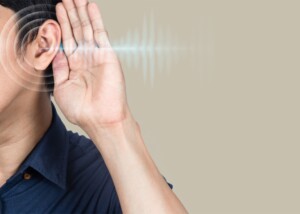
Does your jaw feel fine, no clicking, but you’re wondering if your unexplained tinnitus is being caused by a TMJ disorder?
“The majority of TMJ patients I treat have no noise in their joints, no actual discomfort in their jaws and have an extremely healthy dentition,” says Jeffrey Haddad, DDS, of Doolin Haddad Advanced Dentistry in Rochester, MI.
“ Unfortunately, they are suffering daily with migraines and muscular tension headaches, ear congestion and pain, upper neck pain and discomfort, and ringing in the ears or vertigo,” continues Dr. Haddad.
“Just because you are not experiencing any jaw pain or discomfort, does not mean that a jaw issue isn’t causing other symptoms.
“In fact, even if they do have other symptoms of a TMJ disorder, they are usually most focused on the tinnitus because of how adversely it affects their daily life.”
Tinnitus is also known as “ringing in the ears,” though the noise may sound more like a steady high hissing, or a crackling or tinkling.
“Unfortunately, because they don’t have any jaw discomfort, soreness, or no clicking or popping in the joint, they assume that their bite is ‘fine,’ when in reality it is not,” explains Dr. Haddad.
“Many of these patients have other TMJ symptoms besides jaw pain, but they are only concentrating on the tinnitus because of how prominent it is.”
Sometimes the subjective noise sounds like a high frequency tone or pitch, known as a sine wave.
Tinnitus actually has a ton of causes, including earwax buildup, side effects of medications, recent exposure to loud noise and age related deterioration of the inner ear structures.
“Because the word ‘joint’ is involved in this heading, most patients, physicians and even dentists believe that clicking, popping or pain in the temporomandibular joint (TMJ) needs to be present if a person is considered a ‘TMJ’ patient.
“This can be true of many patients, but does not have to be the case for a patient to have a TMJ disorder.
“Most patients, and even many doctors, are not aware of how a misaligned or unstable bite can adversely affect the head and neck.
“The muscular tension from a poor jaw posture can cause many symptoms including headaches, migraines, neck pain and even many ear symptoms like tinnitus or vertigo.
“Unfortunately, these people who are suffering often never identify the root cause of these symptoms because of the lack of understanding of this connection in the medical and dental fields.”
The bottom line is that, indeed, TMJ disorder is capable of causing only one symptom: tinnitus.
However, the patient may also have a few other symptoms being caused by temporomandibular joint disorder but is not making the connection.
As Dr. Haddad pointed out, neck pain and headaches can be caused by TMJ disorder, but the patient might be attributing these to, for instance, gym workouts and stress tension, respectively.
Dr. Haddad is presently treating Cathleen, a patient whose only symptom of tinnitus was being caused by her TMJ disorder. TMJ dysfunction doesn’t always cause jaw symptoms.

Dr. Haddad lectures nationally on cosmetic dentistry, TMJ disorders and practice marketing, and utilizes the latest technology to ensure the utmost in patient comfort and care.
 Lorra Garrick has been covering medical, fitness and cybersecurity topics for many years, having written thousands of articles for print magazines and websites, including as a ghostwriter. She’s also a former ACE-certified personal trainer.
Lorra Garrick has been covering medical, fitness and cybersecurity topics for many years, having written thousands of articles for print magazines and websites, including as a ghostwriter. She’s also a former ACE-certified personal trainer.
.









































